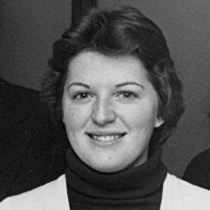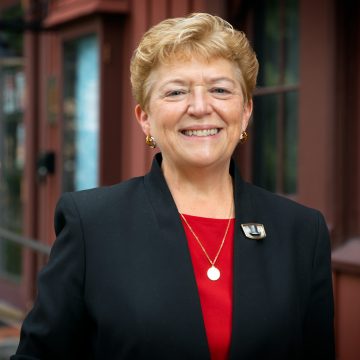Faculty Who Failed Series: Kathryn J. Boor

Kathryn J. Boor during her senior year at Cornell.
August 28, 2023
Graduate school is a time for students to push themselves, try new things, and explore. It’s also a time when students are likely to experience what feels like failure. These small or large challenges along the way to your degree are to be expected, and most faculty members experienced such stumbles themselves in graduate school.
To share stories of successful people who have overcome the setbacks that come with pursuing a graduate degree, we’re interviewing faculty members about how they “failed” in their academic careers. The Faculty Who Failed series highlights how resilience can carry you through the tough times in your degree program and come out of the experience stronger and better prepared for future challenges.
Read about Dean of the Graduate School and Vice Provost for Graduate Education Kathryn J. Boor‘s experiences.
Can you describe a time you felt like you failed in graduate school? This could be a time when an experiment didn’t work out, you considered leaving (or did leave) your program, etc.
When I first enrolled in graduate school at the University of Wisconsin, straight from my undergraduate degree here at Cornell, I was certain that my failed laboratory experiments meant that I was a failure as a scientist and as a person. I thought that I was supposed to be able to solve my research challenges entirely on my own. I abruptly withdrew from graduate school without discussing what I was experiencing with my advisor, much to his complete shock and dismay. Essentially, I dropped out of school. Fortunately, and perhaps, ironically, I learned to communicate effectively with my advisor only after I left campus. He agreed to work with me on a project that I was able to secure in east Africa. When I returned to Wisconsin after two years with a completed project, I was able to successfully wrap up my master’s degree and then move on to other adventures.
How did you bounce back from your perceived failure, or what got you through to the other side?
It was pretty tough at first. I was adrift, being out of school for the first time in 18 years. However, I was offered the opportunity to join a team focused on addressing some agricultural and human nutrition challenges on smallholder farms in Kenya. I jumped at the chance to do so. That project and opportunity redirected my entire career, as I saw firsthand that much human suffering is preventable and I pledged myself to do something about it. The work was exciting and fulfilling. At the end of two years, I had amassed a body of work that was appropriate for a master’s thesis and I gained permission from my employer and from the University of Wisconsin to submit the work to that end. That allowed me to bring my time at the University of Wisconsin to a satisfactory ending.
What lessons did you learn from this experience?
- Develop effective communication with your faculty as quickly and as completely as possible.
- Your faculty are committed to your success and will help you, if you give them the chance to do so.
- Your faculty expect you to wrestle with difficult questions and they are there to help guide you. In general, most faculty get excited about trouble-shooting.
- Expand your faculty network beyond your main advisor to include others with complementary interests.
- Avoid “burning bridges” with your faculty relationships unless absolutely necessary. The world of academia and each of our disciplines is much smaller than meets the eye.
- Experiments that don’t work the way you predicted they would are often at least as informative than those that do. Be sure to analyze what the data are telling you.

How did you use this experience to become better at what you do?
In two important ways: (i) the experience redirected my career to focus on control of transmission of pathogens in food systems as a way to reduce human suffering. As a consequence of jumping into my experience in Africa, I discovered the scientific passion that has carried me through my entire career; and (ii) as a professor, and now, university administrator, my having gone through such a painful experience early in my academic career has given me insight into and empathy for others who struggle.
What advice do you have for current graduate students who might be struggling or in a comparable situation?
In contrast to your undergraduate experiences, as a graduate student, you are very likely to experience what may feel like failure in one way or another. You’ll be asking questions that don’t currently have clear answers. You will inevitably stumble in ways small and large. Earning your graduate degree demands that you push yourself to try new things and to explore new ideas, which is often uncomfortable. It’s important to remember that you are here as a student, which by definition means that you are here to learn. Making mistakes, recovering, and moving on are all essential for learning. In fact, setbacks can help you develop your skills and abilities and become lessons learned toward achieving your goals. In terms of practical day-to-day advice, I strongly recommend prioritizing time for physical activity, and especially for outdoor activities, which might simply include walking around Beebe Lake or the Botanic Gardens. And be sure to talk to your advisor, your director of graduate studies, your graduate field assistant, and your colleagues and friends. It’s highly likely that they will have suggestions for addressing the challenges you’re experiencing.
